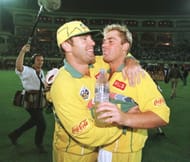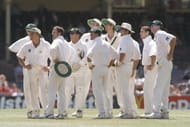Next in our series featuring the best cricket captains of all time is the Australian left-handed opening batsman Mark Taylor. Born on 27th October 1964, in Leeton, New South Wales, Mark Anthony Taylor, also known as “Tubby” in his playing days is well remembered for his adventurous and effective style of captaincy which took an Australian team in a rebuilding phase under Alan Border and set it well on course to becoming the juggernaut that dominated world cricket from the late 1990s to the 2000s.
The batsman
Mark Taylor the batsman started off as a prolific left-handed opener, with a natural tendency to jump on the front foot, good through the covers but equally brilliant with a scathing square cut, and the pull. He started with 1219 runs in his debut season, the first time a batsman had crossed 1000 in the first test season, but couldn’t quite maintain the consistency towards the latter half of his career. There were times when he had to face criticism for his lack of runs, with his place in the team coming under question, let alone his spot as captain. But the Australian selectors put their faith in Mark Taylor, and he repaid them with an exemplary career as arguably Australia’s best test captain of all time.
The captain
As a captain and a cricketer, Mark Taylor came across as diametrically opposite to his predecessor, Alan Border. Where Border was an intense man, conservative with his test match captaincy, but attacking in ODIs, Taylor came across as a light hearted character, with an aggressive attitude in tests, but funnily, conservative in ODIs. The latter got him out of the ODI side a few times, but not without leading Australia to the 1996 World Cup finals. What he lacked in constant on-field intensity, Taylor made up for, with an eye for the turning points in a game. He was known to be a brilliant tactician.
His first assignment was the tour of Pakistan in 1994, without Australia’s first-choice pace bowlers, hunting for their first test win since 1959. Although they couldn’t score a win, Taylor’s adventurous captaincy got them close on two occasions. An Ashes win at home followed, but what really cemented Taylor as an exceptional leader was the drubbing of West Indies in the Caribbean in 1995. The Australian touring side was battered in the ODIs, the medium pacers faced injuries, and the replacements were inexperienced. They hadn’t won a series in the Caribbean for 22 years, no less. What followed was a 2-1 Australian win, on the back of some inspired captaincy from Mark Taylor, who got his greenhorn attack, not particularly known for consistent bowling, to bowl to attacking fields with rich rewards!
Taylor would come to be known as a captain who backed his bowlers to the hilt. Future greats Glenn McGrath and Shane Warne flourished under Mark Taylor’s leadership. Shane Warne especially can be looked upon as an example of Taylor’s nous. Leg-spinners are a tricky breed to control on their best day, and if you’re leading a side that is habituated to pace quartets, it’s very easy to slip up and squander that resource. Taylor’s understanding of the game, and his propensity to take bold decisions allowed him to use Warne’s potential and gave him the stage he relished so much. The fact that Taylor was the best slip catcher in world cricket in his time, would be of immense help, as he was always close to the action in critical moments.
The High[-and-low-]Lights of Mark Taylor’s captaincy
While the Caribbean series win in 1995 was an undoubted highlight of his fledgling captaincy career, Sri Lanks’s 1996 tour of Australia would be one of the low ones owing to the controversies that ensued. Muttiah Muralitharan, Sri Lanka’s spearhead off-spinner was no-balled seven times in the second test, for allegedly ‘chucking’ the ball. The matter worsened with allegations of racially abusive sledging and cheating being levelled on Taylor’s men by the Sri Lankans. The lowest point came in the second final of the ODI tri series, when Sanath Jayasuriya and Glenn McGrath got into a physical tangle mid-pitch, the former accusing the latter of making racist comments. The match ended with both teams refusing to shake hands.
Taylor’s effectiveness in man-management was underlined by Australia’s performance in the World Cup that followed. Without letting the recent controversies, and the matter of forfeiting a match in Sri Lanka owing to security threats distract them, Mark Taylor led his team to the finals, only to lose to Sri Lanka. Australia weren’t the favourites by any means, but they had shown nerves of steel to come back from the dead to beat the West Indies in the semi-finals.
The following seasons saw decline in Taylor’s form, bringing his place in the team under the scanner. After a long string of failures, Taylor even dropped himself from the team during the ODI series in South Africa. With his back firmly against the wall, Mark Taylor answered his critics with a fighting century in the second innings of the second Ashes test in 1997, sparking a turnaround that saw Australia win the series 3-2.
His finest moment, though came at the very end of his career, in Rawalpindi, 1998 when Taylor scored a dogged triple century after batting for two days straight. Finishing the day’s play on 334 not-out, Taylor was asked about his plans for the next day. He replied, “I’m thinking about declaring overnight, actually, still haven’t made up my mind, but that would be the best thing for the team. … The score being same as Sir Don, it might be the only thing I am compared with him for.” And sure enough, Australia declared overnight, with Taylor within reach of Brian Lara‘s then world record 375*. Australia went on to win the series, recording their first series win against Pakistan in 39 years.
Taylor’s swansong was the 1998-1999 Ashes series in Australia, which Taylor’s team won 3-1. In his last series, Taylor broke Alan Border’s record for the most catches in test cricket, finishing on 157 scalps in all. The only target that eluded him was a series win against India in India.
Mark Taylor, with a test match record of 26 wins, 11 draws and 13 losses and a wealth of accomplishments on and off the field, will certainly go down as one of the best all time test cricket captains in world cricket.
Read more on this series here.
Brand-new app in a brand-new avatar! Download CricRocket for fast cricket scores, rocket flicks, super notifications and much more! 🚀☄️


